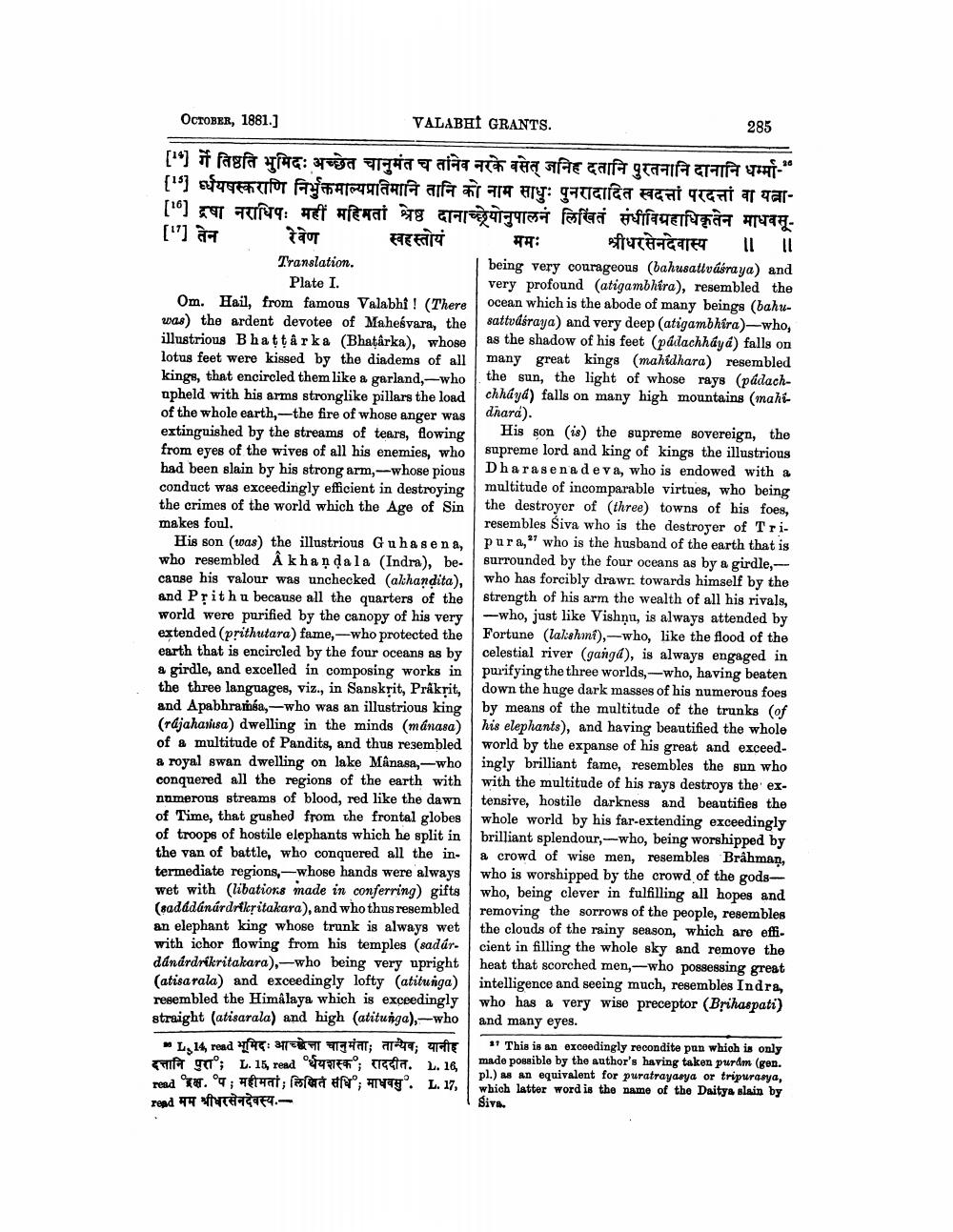________________
OCTOBER, 1881.]
VALABHI GRANTS.
285
[14] में तिष्ठति भुमिदः अच्छेत चानुमंत च तानेव नरके वसेत् जनिह दतानि पुरतनानि दानानि धर्मा-" [1] र्धयषस्कराणि निर्भुक्तमाल्यप्रतिमानि तानि को नाम साधुः पुनरादादित स्वदत्तां परदत्तां वा यत्रा[1] द्रषा नराधिपः महीं महिमतां श्रेष्ठ दानाच्छ्रेयोनुपालनं लिखितं संधीविग्रहाधिकृतेन माधवसू. ["] तेन रेवेण स्वहस्तोयं #
UchiCATET I II Translation.
being very courageous (bahusatlvásraya) and Plate I.
very profound (atigambhíra), resembled the Om. Hail, from famous Valabhi! (There ocean which is the abode of many beings (bahuwas the ardent devotee of Maheśvara, the sattvdsraya) and very deep (atigambhira)-who, illustrious Bhattårka (Bhatarka), whose
as the shadow of his feet (palachháyd) falls on lotus feet were kissed by the diadems of all many great kings (mahidhara) resembled kings, that encircled them like a garland, who the sun, the light of whose rays (pádachupheld with his arms stronglike pillars the load chhayd) falls on many high mountains (mahiof the whole earth,-the fire of whose anger was
dhara). extinguished by the streams of tears, flowing
His son (is) the supreme sovereign, the from eyes of the wives of all his enemies, who supreme lord and king of kings the illustrious had been slain by his strong arm, --whose pious Dharasenadeva, who is endowed with a conduct was exceedingly efficient in destroying
multitude of incomparable virtues, who being the crimes of the world which the Age of Sin the destroyer of (three) towns of his foes, makes foul.
resembles Siva who is the destroyer of TriHis son (was) the illustrious Guhasena, pura," who is the husband of the earth that is who resembled Akhandala (Indra), be- surrounded by the four oceans as by a girdle,cause his valour was unchecked (alchandita), who has forcibly drawn towards himself by the and Prithu because all the quarters of the strength of his arm the wealth of all his rivals, world were purified by the canopy of his very --who, just like Vishņu, is always attended by extended (prithutara) fame,--who protected the Fortune (lakshmi),---who, like the flood of the earth that is encircled by the four oceans as by celestial river (gangd), is always engaged in a girdle, and excelled in composing works in purifying the three worlds-who, having beaten the three languages, viz., in Sanskrit, Prakrit, down the huge dark masses of his numerous foes and Apabhramba, -who was an illustrious king by means of the multitude of the trunks (of (rdjahasiusa) dwelling in the minds (manasa) his elephants), and having beautified the whole of a multitude of Pandits, and thus resembled world by the expanse of his great and exceeda royal swan dwelling on lake Mânasa, who ingly brilliant fame, resembles the sun who conquered all the regions of the earth with with the multitude of his rays destroys the exnumerous streams of blood, red like the dawn tensive, hostile darkness and beautifies the of Time, that gushed from the frontal globes whole world by his far-extending exceedingly of troops of hostile elephants which he split in brilliant splendour --who, being worshipped by the van of battle, who conquered all the in- a crowd of wise men, resembles Brahman, termediate regions, -whose hands were always who is worshipped by the crowd of the godswet with (libations made in conferring) gifts who, being clever in fulfilling all hopes and (sadadánárdrfleritakara), and who thus resembled removing the sorrows of the people, resembles an elephant king whose trunk is always wet the clouds of the rainy season, which are effi. with ichor flowing from his temples (sadár. cient in filling the whole sky and remove the dánárdrikritakara),—who being very upright heat that scorched men,--who possessing great (atisarala) and exceedingly lofty (atitunga) intelligence and seeing much, resembles Indra, resembled the Himalaya which is exceedingly who has a very wise preceptor (Brihaspati) straight (atisarala) and high (atitunga),--who and many eyes. L, 14, read : 3 T 4T; atq;
* This is an exceedingly recondite pun which is only <ift gro; L. 15, read $4976°; ca. 2. 16, made possible by the author's having taken puram (gen.
pl.) as an equivalent for puratrayasya or tripurasya, read 7 °F; neat; fata ; HTTY. L. 17,
which latter word is the name of the Daitya elain by read TH TÈCFT.
Siva.




